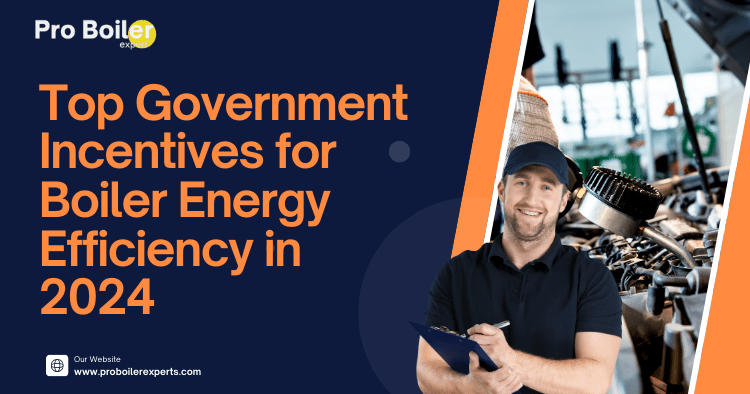Table of Contents
- Introduction
- Understanding Boiler Energy Efficiency
- Federal Incentives
- State-Level Initiatives
- Tax Credits and Deductions
- Grants and Rebates
- Energy Efficiency Programs
- FAQs
- Conclusion
Introduction
As we move towards a more sustainable future, energy efficiency in industrial processes, such as boiler operations, has become a focal point for both government and industry stakeholders. In 2024, various government incentives are available to encourage businesses to upgrade their boiler systems, enhance energy efficiency, and reduce emissions. This article will explore the top government incentives for boiler energy efficiency, helping you understand how to take advantage of these programs.
“Energy efficiency is not just a cost-saving measure; it’s a commitment to sustainability.”
Understanding Boiler Energy Efficiency
Before diving into the incentives, let’s clarify what boiler energy efficiency means. Boilers are essential for industries that require steam or hot water for processes. Energy efficiency in boilers refers to the ability of the boiler to convert fuel into usable heat with minimal waste. Improving this efficiency can lead to significant cost savings, reduced energy consumption, and a smaller environmental footprint.
Key Benefits of Boiler Energy Efficiency:
- Cost Savings: Lower energy bills due to reduced fuel consumption.
- Environmental Impact: Decreased greenhouse gas emissions.
- Regulatory Compliance: Meeting state and federal regulations for emissions.
- Increased Equipment Lifespan: Improved maintenance and reliability.
“Investing in energy efficiency today leads to a more sustainable tomorrow.”
Federal Incentives
The federal government offers several incentives to promote energy efficiency in boilers. The two primary programs are:
1. Energy Policy Act (EPAct) of 2005
The EPAct provides tax deductions for energy-efficient commercial buildings, including those with efficient boiler systems. Businesses can receive a deduction of up to $1.80 per square foot for qualifying improvements.
2. The Inflation Reduction Act (IRA)
Passed in 2022, the IRA extends various tax credits and incentives for energy efficiency upgrades, including boilers. Businesses can claim up to 30% of qualifying expenses related to energy-efficient upgrades, which can significantly offset installation costs.
For more detailed information on federal incentives, visit the U.S. Department of Energy.
“Understanding available federal incentives can lead to substantial financial benefits for your business.”
State-Level Initiatives
In addition to federal programs, many states have implemented their own incentives for improving boiler energy efficiency. These vary widely based on state regulations and funding availability.
Popular State Incentives:
- California: The California Energy Commission (CEC) offers rebates for energy-efficient boilers and encourages participation in the California Public Utilities Commission (CPUC) programs.
- New York: The New York State Energy Research and Development Authority (NYSERDA) provides financial incentives and technical assistance for upgrading heating systems, including boilers.
For state-specific information, check out the Database of State Incentives for Renewables & Efficiency (DSIRE).
“Each state has unique programs that can further enhance your energy efficiency efforts.”
Tax Credits and Deductions
Tax credits and deductions are some of the most effective incentives for businesses looking to improve energy efficiency.
Available Tax Incentives:
- Section 179D Deduction: This allows commercial building owners to deduct the cost of energy-efficient improvements, including boiler upgrades, from their taxable income.
- Investment Tax Credit (ITC): Businesses can receive a credit for up to 30% of the cost of installing new energy-efficient equipment, including boilers.
Using these credits can greatly reduce the overall cost of upgrading to a more efficient boiler system.
“Leveraging tax incentives can significantly lower the upfront costs of energy-efficient upgrades.”
Grants and Rebates
Many government entities provide grants and rebates to encourage businesses to invest in energy-efficient technologies.
Key Programs:
- EPA’s Energy Star Program: Provides rebates for upgrading to Energy Star-rated boilers.
- Local Utility Company Incentives: Many utility companies offer rebate programs for businesses that install energy-efficient boilers. Check with your local utility provider for available programs.
Visual Element: Sample Grant and Rebate Overview
| Program Name | Type | Potential Savings | Eligibility Criteria |
|---|---|---|---|
| Energy Star Rebates | Rebate | Up to $5,000 | Must install Energy Star-rated equipment |
| Utility Company Incentive | Grant | Varies by utility | Must meet specific efficiency standards |
“Grants and rebates can provide immediate financial relief and make upgrading more feasible.”
Energy Efficiency Programs
Various energy efficiency programs are available both federally and at the state level. These programs often provide technical assistance, funding, and educational resources to help businesses improve their energy efficiency.
Notable Programs:
- The Better Buildings Initiative: A federal program that encourages organizations to adopt energy-efficient technologies and practices, including efficient boilers.
- State Energy Programs (SEPs): Many states have their own SEPs that focus on improving energy efficiency in industrial settings.
For more details, visit the U.S. Department of Energy’s Better Buildings Initiative.
“Participating in energy efficiency programs can provide valuable resources to optimize your operations.”
Also Look For
For additional insights, consider the benefits of different types of boilers that can enhance energy efficiency. You might find valuable information in these articles:
- Top 5 Benefits of Choosing Combi Boilers for Your Home
- Top 5 Benefits of Condensing Boilers You Should Know
- Top 5 Energy Efficient Heating Systems for Your Home
“Exploring different boiler options can reveal additional energy efficiency opportunities.”
FAQs
1. What is the best way to find available incentives?
You can start by checking the DSIRE website for a comprehensive list of available incentives in your state.
2. Can small businesses benefit from these incentives?
Absolutely! Many of these programs are designed to support small and medium-sized enterprises, making energy-efficient upgrades more accessible.
3. How do I apply for these incentives?
Application processes vary by program. Generally, businesses will need to provide documentation of the installation and energy savings. It’s best to consult the specific program’s website for detailed instructions.
4. Are there penalties for not upgrading to energy-efficient systems?
While there may not be direct penalties, businesses could face higher operating costs and potential regulatory fines if they fail to meet energy-saving mandates.
“Staying informed about available incentives can be a game changer for your business.”
Conclusion
Investing in boiler energy efficiency is not only a smart business move but also a step toward a more sustainable future. With a variety of government incentives available in 2024, businesses have numerous opportunities to offset the cost of upgrading their systems. Take advantage of these programs to improve your bottom line while contributing to energy conservation efforts.
For more information on energy efficiency and to stay updated on future incentives, keep an eye on resources like the U.S. Department of Energy and your local government’s energy office. Happy upgrading!
“Embrace energy efficiency and be part of the solution for a better environment.”





